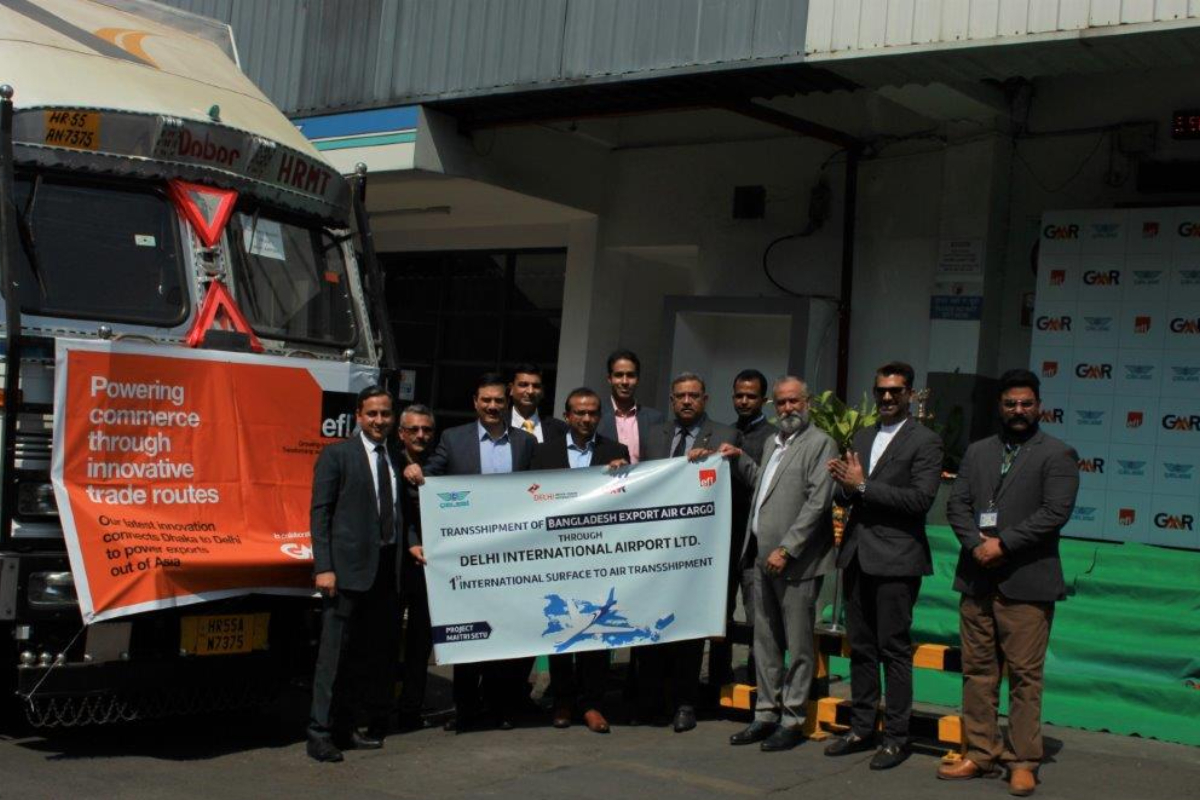Delhi International Airport Limited (DIAL), a subsidiary of GMR Airports Infrastructure Limited (GIL), on Friday, March 3, welcomed the first batch of transhipment cargo from Bangladesh.
The development paved the way for a faster and more cost-effective route for shipping export cargo internationally.
The first batch of cargo, which left Dhaka on February 26 and arrived at Delhi Airport on Friday, will leave for its destination in Spain on March 5.
Delhi Airport received approval from the Government of India on February 7, allowing DIAL to serve as a cargo transhipment hub between Bangladesh and other global destinations for export cargo.
The decision by the government is expected to boost the national economy while reducing shipment costs significantly for manufacturers. It will also increase the daily export of international cargo via Delhi Airport, including ready-made garments (RMG), handlooms, footwear, leather products, jute products, and pharmaceuticals.
Over the years, Bangladesh has emerged as a global manufacturing hub for ready-made garments. The new route of transportation is expected to create new vistas of opportunity for the South Asian country.
Since Bangladeshi manufacturers rely heavily on India for raw materials including threads, textiles, jute, leather, and pharmaceutical raw materials, any boost in exports will directly result in an increase in demand for produced-in-India raw materials in Bangladesh.
Bangladeshi RMG products are especially in demand in Germany, the United Kingdom, France, Spain, Italy, the Netherlands, Denmark, parts of Eurasia, and the USA. With Delhi Airport’s direct connectivity to most European nations, this route will further boost the Indian government’s initiative of helping reach countries of the Indian sub-continent to their full potential.
The transhipment cargo will reach Delhi from Dhaka via the Bangladesh-India border at Benapole-Petrapol. Once the cargo leaves the Petrapol border after all security checks, the manufacturers will be able to track their shipment throughout its journey, including its arrival at the Delhi Airport, during security clearances and the final uploading of cargo on the aircraft.
To ensure ease of doing business, DIAL has created a special truck docking facility and a dedicated X-ray area for the swift transfer of cargo to their outbound locations.
CEO of DIAL, Videh Kumar Jaipuriar, said, “With this initiative, the Delhi Airport is on its way to becoming the international cargo hub of the world, serving as a transhipment centre between East and West.”
“Globally, most manufacturing happens in South and South-East Asian countries, which lack freight and cargo handling capacity. This is where Delhi Airport can help nations come together, help businesses and help the economies of neighbouring countries prosper,” Jaipuriar said.











It’s very hard to agree with this point Arshia. I think you’d have done better to cite proof of these claims such as ‘rehabilitation programs help families and the society’. What are the statistics on this? What are the genuine concerns for those who are not rehabilitated? And most importantly, for readers, why should they get a second chance at life considering what they did.
ISIS men participated in mass rapes of Yizidi women, beheadings and extreme violence against the people in Syria. They raped young girls, some just infants. They did this all under a religious ideology that threatened to radicalize more youth from countries. So it is justified that people want revenge, and want people like Shamima to rot, regardless of her age or ‘innocence’.
I saw an interview with meg smaker who made Inside Jihadi rehab and she makes a case for why these programs are important and how effective they are. It would be helpful to have that perspective – that some people were not only young but didn’t do anything and others were trained killers intent on massacreing people.
I’m not convinced Shamima shouldn’t be locked up and disposed of (her kids should be brought to safety – they are completely innocent). I understand youthful folly but many of those who were returned to their original countries have shown to NOT be deradicalized but in fact are happy to rejoin ISIS should it start again. The only people I have sympathy for are the kurds and syrians who need to deal with this sludge on their own lands and have to care for them. And for the kids who are being indoctrinated in those camps.